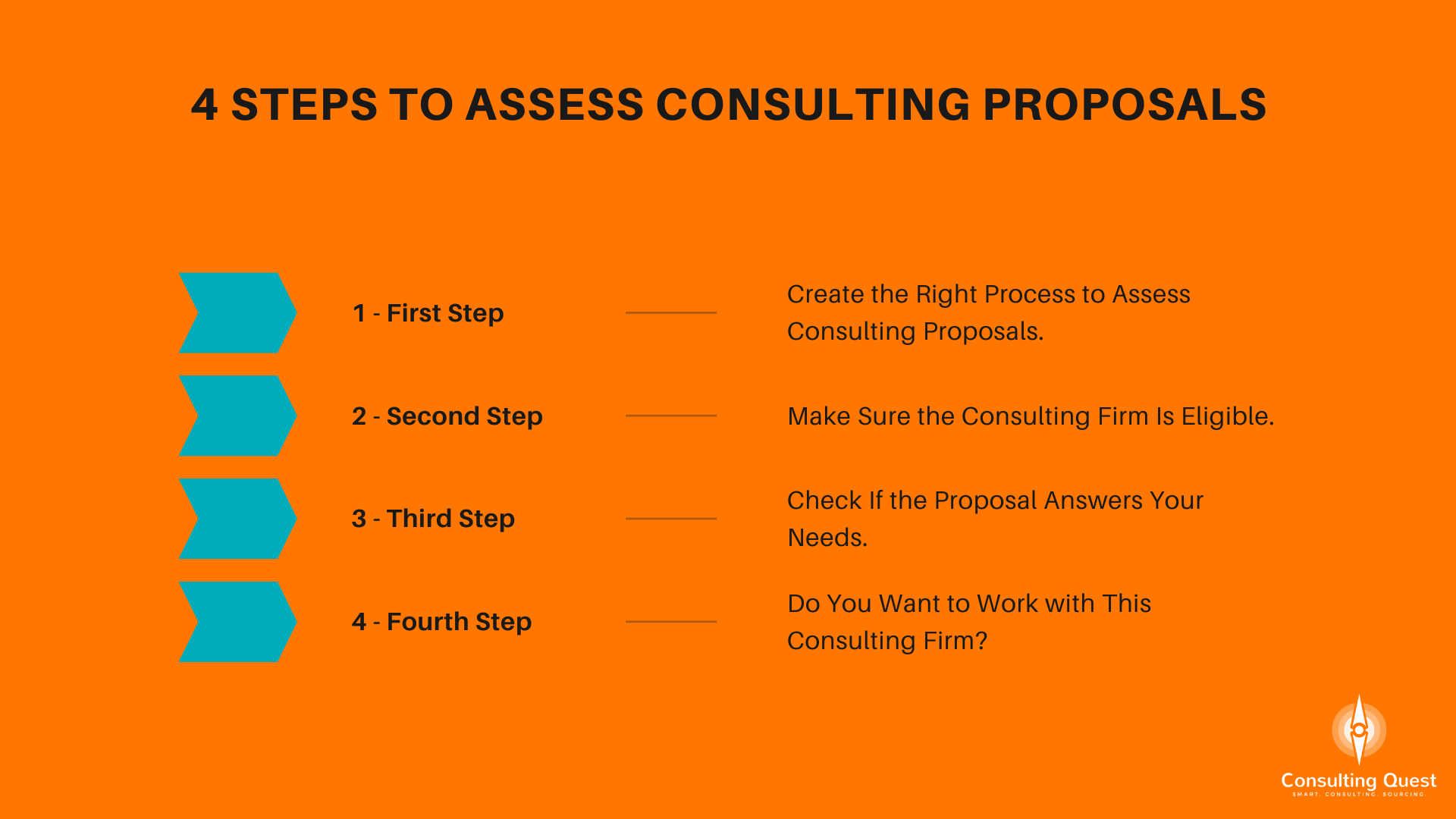Table of Contents
Has the process to assess consulting proposals ever seemed to you somewhat akin to dating? Some catch your eye immediately, while others… well, let’s just say you’d swipe left.
Just like finding the perfect match isn’t about the flashiest car or the most charming pick-up line, choosing the right consulting firm isn’t about the glossiest proposal or the fanciest jargon.
Before you say ‘I do’ to a consulting partner, you’ll want to make sure there’s more than just surface-level allure. Dive into our 4-step guide on how to assess consulting proposals, where we’ll help you distinguish the consulting soulmates from the mere summer flings.
Let’s embark on this romantic (okay, professional) journey to find ‘The One’ for your project!
Step #1: Create the Right Process to Assess Consulting Proposals
Choosing the right consulting proposal can be the difference between a project’s success or stagnation. To navigate the sea of proposals and pinpoint the ideal fit for your organization, a structured approach is imperative.
Funneling the Proposals: From Excellent to Off-tracks
On a large project, your shortlist may still matter. So, if you want to devote enough time to each possibility, funnel it down to the top choices, and set aside the rest of the work, think of it as a funnel that loads with all of the proposals.
You should start with the most promising bids. At the absolute minimum, these fulfill all of your RFP’s requirements. The proposals are convincing, and you have a clear picture of how the project would progress.
Above the top-of-funnel are projects that have fallen slightly off track but may still be salvaged. Perhaps they have a solid rationale, but they’ve overlooked an insignificant step. You don’t want to prematurely eliminate a potential treasure in the process.
Off-topic or overly general proposals appear at the top of the funnel. Do not immediately eliminate all of the other ideas; they are still very important.
Take the Time to Make Your Decisions
Don’t get too far ahead of yourself. Once you’ve chosen a firm and have agreed on a fee, the process isn’t finished until you’ve signed a contract with them. Don’t be hasty in rejecting the second runner.
Don’t overlook a unique consulting firm’s proposal with a fantastic concept but subpar writing/presentation abilities. There may be a way to implement at least part of the solution in your company.
When you send a response to potential consulting vendors with rejected proposals, regardless of how you feel about their most recent bid, don’t be hasty to cut ties. Here’s why: these consultants may transform into excellent partners or future suppliers in a world of fast transformation.
Build the Right Team to Assess the Proposals
You’ve received the bids in hand that, at first look, appear to fulfill your eligibility criteria and other key factors. It’s time to get down to business and choose your evaluation team.
Who is likely to be on your team of reviewers? Procurement experts, naturally, and the person in charge of the consulting budget, if any. You should also include the main stakeholders, such as the project leader and representatives from the impacted functions.
Perhaps a senior executive or two who has worked with consulting before. Ideally, the panel of assessors should be composed of people who were involved in creating the RFP.
Input from a variety of stakeholders aids in making the evaluation procedure seem impartial and more likely to result in the best proposal for your project.
Consider including a competent and experienced consultant on the team to assist you in developing a procurement process that will bring you the greatest possible benefit for your business.
Set the Ground Rules for the Evaluation
It’s critical to have all of your evaluators on the same page when it comes to a few fundamental principles:
- Your project’s goals must be answered in the winning proposal.
- The chosen method will further the project’s overall goal.
- The consultants must have the required skills.
- You must choose qualified consulting providers who are a good fit for your company culture.
Agree on the most appropriate approach based on the project’s context and culture. You may want to use a unique, creative, breakthrough, or transformative technique in your firm’s strategy. Alternatively, you could prefer a tried-and-true approach.
Encourage the team to evaluate the proposed solutions in terms of problem resolution, clarity, internal consistency, and ease of implementation, as well as outside-the-box thinking.
Step #2: Make Sure the Consulting Firm Is Eligible
There are certain requirements to work with your firm. And a preliminary examination may immediately eliminate a consulting service and save you some time.
Are They Qualified and Compliant?
Many businesses have stringent registration restrictions, which include extensive checks. Check to see whether your consulting business is already registered or if your project qualifies for an exceptional procedure.
It may seem formal, but the fact that they’ve already taken the time to register with your company will give you an indication of their dedication and capacity to meet your demands.
If a consultant submits a proposal too late, incomplete, or not in accordance with the format, it is because he or she has misunderstood your requirements or does not want to adapt to your methods. In either case, there is an issue.
Are You Compatible?
Hiring the wrong consulting company might harm your reputation both inside and outside the organization. Make sure that your supplier’s ethics are in line with yours.
Consultants frequently deal with a variety of businesses in the same sector and/or geographic location. Even if they establish Chinese walls to safeguard your privacy, you might want to double-check for a potential conflict of interest.
Finally, with the globalization of consulting projects, an increasing number of clients are seeking outside sources. It’s not unusual for a European consulting firm to be chosen for a project by a U.S. client.
When you are working with a company that will fly their consultants to your premises, ensure they have adequate work authorizations for your country and your industry.

Step #3: Check If the Proposal Answers Your Needs
You’re bringing the consulting firm to help you achieve a specific objective, of course. You want them to understand your goals and assist you in finding and implementing a solution.
Is the Proposal Answering Your RFP?
A proposal that doesn’t thoroughly describe your needs implies a limited knowledge of your company, a rushed or generic offer, or some combination thereof. On this point, you must be firm.
You want to be sure the consultant responds to your queries and contributes something beyond simply repeating your RFP. The offer may include elements that don’t appear to be connected. Several causes might explain this pattern.
The first alternative is that you are dealing with a “cookie-cutter” problem. The consultant is copying and pasting a previous proposal for your project. The second alternative is for the consultants to have seen an objective that you had overlooked in your RFP.
In each case, you must demand that the consultant double-check the fit with your needs. You must buy only what you need, and nothing more.
Do the Deliverables Completely Satisfy You?
Once you’ve confirmed that the consultants have comprehended your goals, you should review the deliverables they proposed in the bid to seeing whether they will truly answer your queries.
It’s critical to ensure that the consultants have addressed all key elements of the scope and that you may compare the proposals’ core.
Return to your RFP and check one by one for any unanticipated deliverables. Determine what’s outside the scope of the bid. Sometimes consultants take the initiative to rearrange and regroup the deliverables on their own. Make sure all of your intended outputs are still in place.
In other situations, the consultants provide items that were not mentioned in the RFP. Examine how they fit into your key goals. It may be a nice addition or simply an attempt by the consultant to broaden the scope (and price). If the product is relevant, consider if it’s a must-have or a nice-to-have.
Are the Proposed Timeline and the Phasing Aligned with Your Expectations?
Is the timeline consistent with your company’s goals? Is it a significant problem if it isn’t? Have the experts explained why they shortened the schedule.
Consultants adore chopping a project up into numerous phases. When comparing the various bids, make sure each phase has the same amount of work and items. It’s not unusual for a consulting firm to descope or underprice the initial phase in order to win the contract and accumulate greater expenses in later phases.
For very large projects (i.e., screening, acquisition, integration), we recommend including phasing and committing only to the first phase in the RFP.
The following phases will be handled through a second RFP. It will put the winner of the initial project under considerable strain, requiring him to perform well during each phase of the project.
Is the Project Organized and Staffed Properly?
Sometimes it’s due to the different responsibilities (and thus workload) of consultants vs. your staff that one offer is more expensive than another.
How will the project’s management be structured? How is the project led at the steering level? What type of assistance do you anticipate from your teams at each phase of the process?
When compared with the workload of the project, does the team appear to be enough? And on the other side, is it possible that the crew is too big?
Step #4: Do You Want to Work with This Consulting Firm?
Before finalizing any proposal, it’s crucial to evaluate not only the written content but also the dynamics of the partnership. The ultimate goal is to ensure a harmonious and effective collaboration.
Do You Like This Approach?
Don’t accept a proposal just because it looks good on paper. You have to feel comfortable with the approach and be willing to work with them.
Examine the approach suggested by the consultant. Is it what you wanted? Is it sensible? Is it appropriate for your requirements?
Check if there are potential limitations of the approach that the consultant is suggesting. Will this approach support a proper buy-in?
Do You See Yourself Working with the Consultant?
Look at who are the members of the consulting team and how you interacted with them. Do you think they will get along with your staff and be a good fit?
Last but not least, you need to check the leadership of the project team and its credibility with your teams. What is the level of seniority of the partner in charge?
Is he taking responsibility for the project or delegating that to someone more junior? What is the level of experience of the project team? Will this work with your teams?
A Quick Round-up
It is crucial to assess consulting proposals with a discerning eye. And this examination involves a lot more than just sifting through pages; it’s about ensuring the success and value of your upcoming project.
Adopting a systematic approach to evaluate these proposals not only makes the overall consulting procurement process more objective but also elevates the outcome.
Yes, the expertise in the proposal is paramount, but let’s not forget: consulting revolves around human connection as much as it does around knowledge.
The synergy you feel with the consulting team can be the defining factor in the project’s success.
And here’s a little insider tip: Use the proposal assessment phase as an opportunity to manage change and engage top leadership, even before the project kicks off.
It’s essentially applying Project Management 101 to your consulting endeavors. In short, be strategic, be thorough, and most importantly, be smart.





